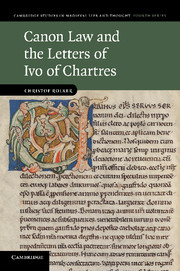Book contents
- Frontmatter
- Contents
- List of abbreviations
- Note on the citation of manuscripts
- 1 IVO OF CHARTRES – ‘LIFE AND LETTERS’?
- 2 CANON LAW BEFORE IVO
- 3 COLLECTIONS KNOWN TO OR COMPILED BY IVO
- 4 THE CANON LAW IN IVO'S CORRESPONDENCE
- 5 HIERARCHIES OF AUTHORITY: IVO's VIEWS ON DIVINE LAW AND THE ECCLESIASTICAL HIERARCHY
- 6 THE LAWS OF MARRIAGE: ‘QUOD ET NATURA DISPOSUIT, ET LEX TAM ECCLESIASTICA QUAM MUNDANA FIRMAVIT’
- 7 IVO'S DECRETUM AND THE PANORMIA: CHARACTER, RECEPTION, AUTHORSHIP
- 8 IVO'S PASTORAL CANON LAW AND HIS PLACE IN LEGAL HISTORY
- Appendix: A concordance table for the quotations in Ivo's letters
- Bibliography
- Index to single letters of Ivo of Chartres
- Manuscript index
- General index
6 - THE LAWS OF MARRIAGE: ‘QUOD ET NATURA DISPOSUIT, ET LEX TAM ECCLESIASTICA QUAM MUNDANA FIRMAVIT’
Published online by Cambridge University Press: 04 August 2010
- Frontmatter
- Contents
- List of abbreviations
- Note on the citation of manuscripts
- 1 IVO OF CHARTRES – ‘LIFE AND LETTERS’?
- 2 CANON LAW BEFORE IVO
- 3 COLLECTIONS KNOWN TO OR COMPILED BY IVO
- 4 THE CANON LAW IN IVO'S CORRESPONDENCE
- 5 HIERARCHIES OF AUTHORITY: IVO's VIEWS ON DIVINE LAW AND THE ECCLESIASTICAL HIERARCHY
- 6 THE LAWS OF MARRIAGE: ‘QUOD ET NATURA DISPOSUIT, ET LEX TAM ECCLESIASTICA QUAM MUNDANA FIRMAVIT’
- 7 IVO'S DECRETUM AND THE PANORMIA: CHARACTER, RECEPTION, AUTHORSHIP
- 8 IVO'S PASTORAL CANON LAW AND HIS PLACE IN LEGAL HISTORY
- Appendix: A concordance table for the quotations in Ivo's letters
- Bibliography
- Index to single letters of Ivo of Chartres
- Manuscript index
- General index
Summary
IVO'S VIEW ON MARRIAGE
The previous chapter established how the evidence from Ivo's canonical works and his letters can be combined to elucidate his ‘legal’ thought; it also made clear why the discussion of what we call ‘legal’ matters cannot be separated from theological arguments. Finally, while there evidently is a close relation between the the sources of Ivo's understanding of the law as quoted in the letters and his activities as a compiler, it has become clear that it would be very difficult to establish Ivo's position in disputed questions from his Decretum alone.
All these caveats apply fully to the discussion in the present chapter which is devoted to an area of sacramental theology which had special importance for medieval society, and Ivo in particular: the theology of marriage. Matrimony, instituted in Paradise, was ‘ordered by nature and confirmed by both ecclesiastical and secular law’. Indeed, Ivo is a prominent figure in the history of marriage. His Decretum is known to have introduced into canonical discussion a large number of important patristic and Roman law authorities not found in earlier canon law collections. The Decretum, the Panormia and Ivo's letters, and various works drawing on them provided theologians, canon lawyers, judges and other readers with key texts on marriage. In particular, the marriage treatises attributed to the so-called ‘ school of Laon’ all depend on the Ivonian collections either directly or indirectly.
- Type
- Chapter
- Information
- Canon Law and the Letters of Ivo of Chartres , pp. 211 - 247Publisher: Cambridge University PressPrint publication year: 2010



